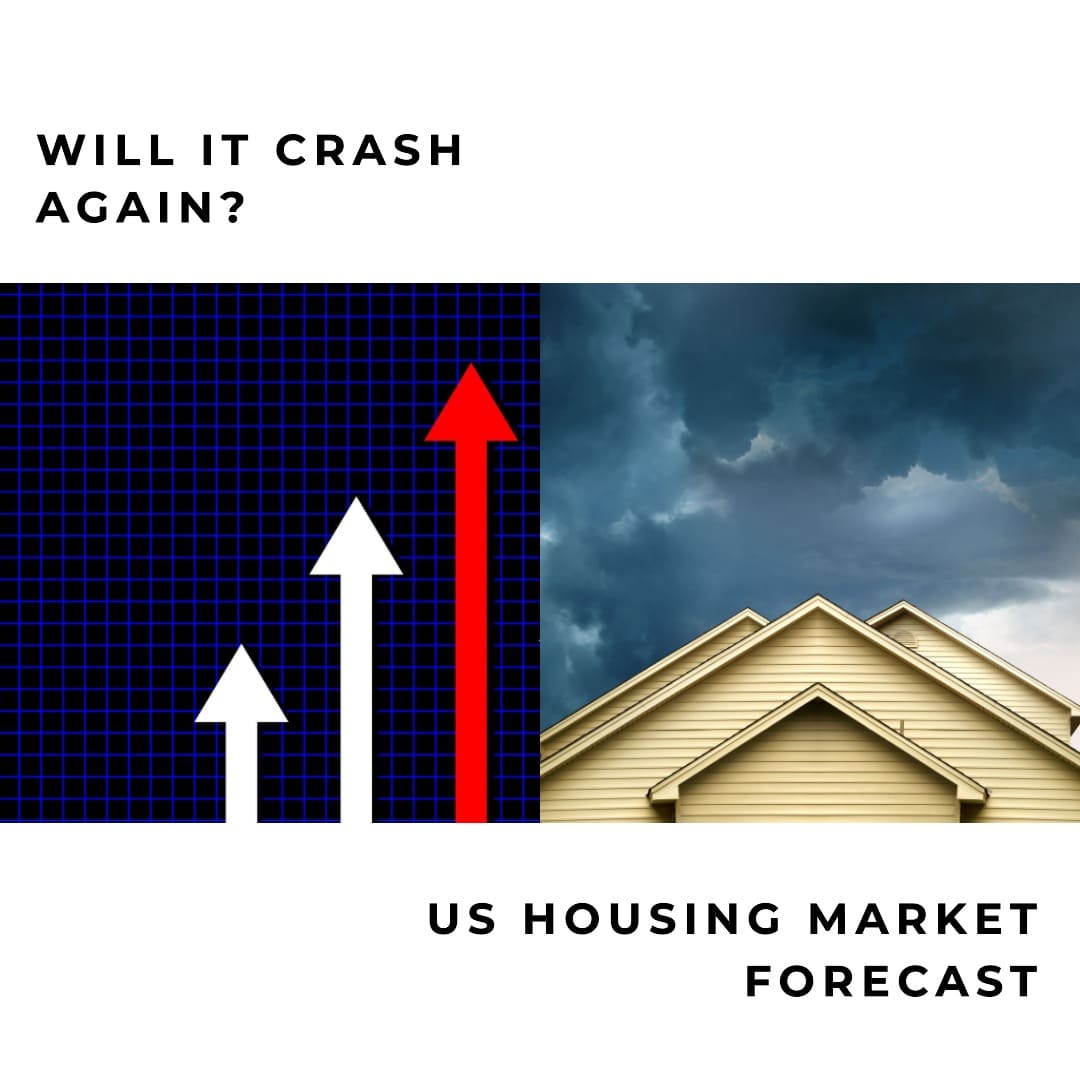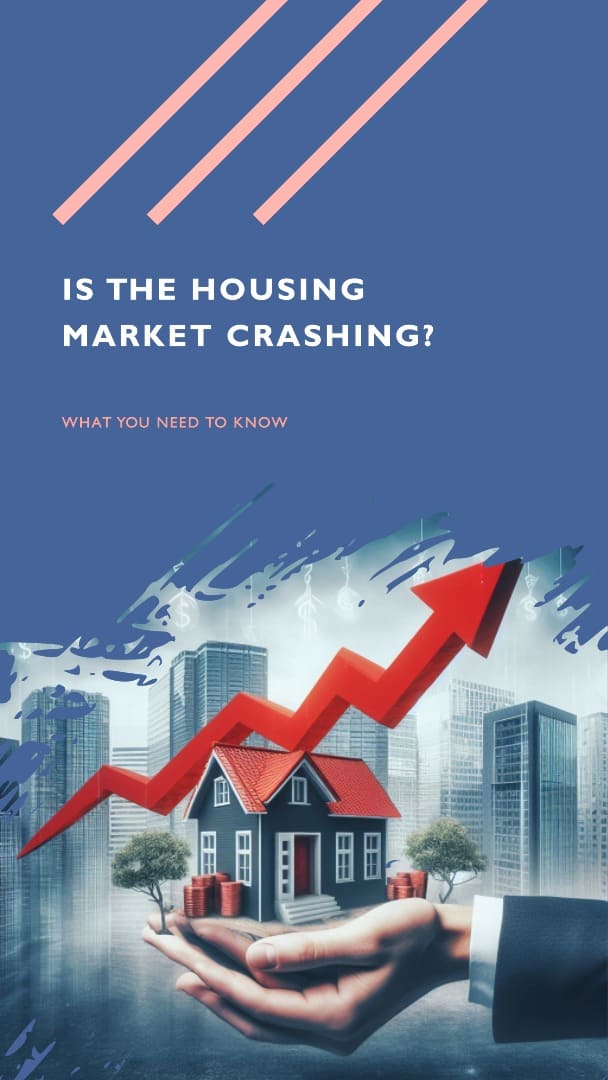

The US housing market is facing a number of challenges in 2023, including rising interest rates, inflation, and a potential recession. These factors could lead to a slowdown in home price growth or even a housing market crash.
Housing market experts are divided on the outlook for the market in 2024. Some believe that the market is overheated and that a crash is imminent. Others believe that the market is more resilient and that a crash is unlikely.
There are a number of factors that could contribute to a housing market crash:
- Rising interest rates: The Federal Reserve is raising interest rates in an effort to combat inflation. This will make it more expensive to borrow money for a mortgage, which could lead to a decline in demand for housing.
- Inflation: Inflation is at a 40-year high, which is eroding consumers’ purchasing power. This could make it difficult for some people to afford to buy a home.
- A potential recession: Economists are warning that the US economy may be headed for a recession in 2023. A recession would likely lead to job losses and a decline in consumer confidence, which could further dampen demand for housing.
However, there are also some factors that could help to support the housing market:
- Strong housing demand: Demand for housing remains strong, especially among millennials and first-time homebuyers. This is due to a number of factors, including population growth, low unemployment, and rising incomes.
- Limited housing supply: The supply of homes for sale remains low, which is helping to keep home prices high. This is due to a number of factors, including a shortage of building materials and labor, and the reluctance of homeowners to sell in a hot market.
When Will the Housing Market Crash?
Inflation is soaring, and there is a fear of an impending recession in the country. However, the majority of real estate professionals do not believe that the housing market is in a bubble or poses a threat to the faltering economy.
Housing caused the worst financial crisis in recent memory. When shoddy mortgages crumbled, the nation was left with foreclosures, numerous new houses remained empty, and millions of Americans were suddenly underwater. Throughout the preceding century, the housing market met considerable barriers, but none, with the exception of the Great Depression of 1929, led to the decrease in home values that happened during the Great Recession of 2007.
It is also important to note that not all economic downturns dampen the real estate market. Despite the economic downturn, the home market and demand remained robust during the 2001 recession. The housing market has been subjected to a number of severe hurdles during the course of the previous century; but, with the exception of 1929’s Great Depression, none of these challenges have resulted in a decrease in house values comparable to that of 2007’s Great Recession.

The housing market’s recent pandemic boom with skyrocketing prices, bidding wars, and an influx of investors has parallels to the previous time. However, this time, the majority of real estate professionals believe that the housing market won’t crash or trigger a recession and may even assist the country’s recovery. The mortgage sector has taken action against loans that ballooned in size or were intended for borrowers to fail. Only purchasers with consistent, verifiable income may now qualify for mortgages.
This has resulted in a significantly lower risk compared to the Subprime lending during the Great Recession of 2005-2007. The majority of bad mortgages have been eliminated, and lenders have stricter requirements on borrowers. The housing shortage is too severe with many more individuals trying to purchase and rent houses than there are available.
Year-over-year home price growth decelerated in 2022 as mortgage rates rose and housing affordability declined. With mortgage rates continuing to remain high, home prices are predicted to decline in the near term. However, experts do not anticipate the widespread unemployment that characterized the Great Recession and also believe that the recession will be quite brief if it occurs. This means fewer homeowners will be unable to pay their mortgages and those who are struggling may decide to sell their homes at a profit.
Many tapped-out homeowners are stepping back as mortgage interest rates rise into the 6%+ range or close to 7%. Some no longer qualify for mortgages big enough to finance the home they desire, others cannot afford the increased rates and prices, and some are taking a wait-and-see strategy out of fear of a recession. As a result, fewer properties are selling, bidding wars are subsiding, and bids beyond the asking price are decreasing. Numerous house sellers have been compelled to reduce their asking prices.
In the event of a recession, mortgage rates are anticipated to decline, which should reintroduce buyers who did not lose their jobs to the housing market. This will increase home sales and benefit the economy as a whole. The housing market can assist the nation in climbing out of a recession.
While the US housing market is experiencing changes in 2023, most real estate professionals do not believe that it will crash or trigger a recession. The mortgage sector has taken action to prevent a repeat of the Great Recession, and the majority of bad mortgages have been eliminated. The housing shortage is too severe, and the majority of Americans are hoping to avoid another 18 months of hardship. The housing market may even assist the nation’s recovery in the event of a recession by increasing home sales.
Millennial Housing Demand: A Buffer Against Housing Market Crash
The housing market crash is a concern for many potential home buyers and sellers. However, the increased demand for homes from the millennial generation may act as a buffer against a potential crash in 2024 and 2025. Millennials and Gen Z want more housing. The housing market is one of the most important indicators of economic growth, and it has been showing some signs of instability in recent years. However, the increased demand for homes from the millennial generation may act as a buffer against the housing market crash.
According to the National Association of Realtors’ 2022 Home Buyer and Seller Generational Trends report, millennials now make up the largest percentage of home buyers at 43%, with Generation X buying the most expensive homes at a median price of $320,000.
The report also found that most buyers purchased homes in suburban areas and small towns, dispelling the myth that younger generations are flocking to city centers. Millennials, in particular, are more likely to use the Internet to find a home they will ultimately purchase, and 92% of them use real estate agents to help find the right home and negotiate the terms of the transaction.
The trend of younger generations purchasing homes for the first time is also on the rise, with 81% of younger millennial home buyers purchasing a home for the first time, and just under half of older millennial buyers being first-time buyers. Additionally, the percentage of millennial sellers is on the rise, increasing from 22% to 26% over the past year.
Many factors can contribute to the decision to buy or sell a home, and for all home buyers under the age of 57, the main driver was the desire to own a home of their own. Among those 57 and older, the desire to be closer to friends and family was the top reason, followed by the desire for a smaller home.
While younger generations tended to move shorter distances when relocating, the overall buyers expected to live in their homes for 12 years, down from 15 years last year. For younger millennials and the silent generation, the expected duration was only 10 years, compared to 20 years for younger boomers.
However, debt continues to be a significant barrier for many attempting to buy a home, and both Generation X and younger boomers delayed purchasing a home for five years due to debt, the longest of all age groups. Younger millennials had the highest share of student debt at 45%, with a median amount of $28,000.
Despite these challenges, the increased demand for homes from the millennial generation provides a buffer against a housing market crash. This demand is expected to continue to grow as more of the millennial generation reaches the traditional first-time buyer age, and with this trend, the housing market may remain stable even in uncertain times.
Is the Housing Market Going to Crash Again?
The current state of the real estate housing market, which is currently adjusting to record-high inflation and higher interest rates, is giving real estate companies and experts a run for their money, as the continued pressure of these forces is causing difficulties for those who make future predictions. What are the housing market crash predictions? Before answering this question, it is crucial to comprehend what causes real estate markets to fall in the first place.

First, it is essential to recognize that housing markets do not suddenly crash. Multiple variables will exert pressure on a market over time, eventually leading to its collapse. When home values climb too rapidly, a housing bubble arises. When there’s demand and the capacity to buy, it may increase. When there aren’t enough houses for sale to match demand, competition drives up prices.
When a housing bubble expands and pressure builds, the housing market may crash. Interest rate hikes slow the economy. Demand and jobs might drop. Oversupply promotes a buyer’s market and cheaper pricing. The real estate market might then fall or stall down. How can you know how awful and how fast it will go better? It depends on how sustainable development was before the slowdown and how serious the causes are.
Many concerns remain about the housing market. Critically, while one of the biggest drivers of home price growth has been the lack of supply, higher rates are holding back both potential sellers and new construction. As such, there is no relief in sight for an improvement in the housing supply and the sustainable housing market that would come with increased inventory.
According to a report by Morgan Stanley, U.S. home prices are expected to fall 7% by the end of 2023. The report cites the “higher-mortgage-rate environment” as the main factor that will dampen housing activity and affordability.
The Federal Reserve Bank of Dallas also identified signs of a “brewing U.S. housing bubble” in the last year’s report, warning that “purchases arising from a ‘fear of missing out’ can drive up prices and heighten expectations of strong house-price gains”.
However, not all experts believe that the U.S. housing market is in a bubble or headed for a crash. Len Kiefer, the deputy chief economist at Freddie Mac, argues that “a bubble has three defining characteristics: price growth is driven by speculation, bubbles are fueled by credit expansion, bubbles pop”.
He claims that the recent price growth was not driven by speculation or credit expansion, but rather by record-low mortgage rates and a fundamental shift in housing demand.
Therefore, the outlook for the U.S. housing market in the next five years may depend on how quickly and how much mortgage rates will rise, how resilient buyer and seller demand will be, and how the supply and affordability of homes will evolve.
In summary, while the housing market may be experiencing a slowdown in year-over-year growth, the data and forecasts do not suggest an imminent crash in 2023, 2024, or 2025 Home prices continue to rise, albeit at a slower pace, and market indicators provide a generally positive outlook.
The US housing market is going through a crucial period with conflicting opinions on the future of the market. Some analysts fear a housing market crash, while others anticipate a more balanced market with single-digit annual appreciation. Although the market is experiencing changes, most real estate professionals do not believe that it will crash or trigger a recession.
The mortgage sector has taken action to prevent a repeat of the Great Recession, and the majority of bad mortgages have been eliminated. The housing shortage is too severe, and the majority of Americans are hoping to avoid another 18 months of hardship.
Housing demand from Millennials and Gen Z is also expected to remain strong. While there may be a decline in demand and the pandemic-induced housing boom may slow down somewhat, there are no signs of a housing market crashing again in the future.
Sources:
- https://www.realtor.com/news/trends/recession-will-housing-market-survive/
- https://www.noradarealestate.com/blog/housing-market-predictions/
- https://www.corelogic.com/intelligence/u-s-home-price-insights/
- https://cre.moodysanalytics.com/insights/research/q42022-the-outlook-for-the-housing-market/
- https://www.forbes.com/advisor/mortgages/real-estate/will-housing-market-crash/
- https://www.zillow.com/research/zhpe-q2-2022-not-a-bubble-31093/
- https://www.freddiemac.com/research/forecast
- http://www.freddiemac.com/research/forecast/20210715_quarterly_economic_forecast.page
- https://www.fhfa.gov/DataTools/Downloads/Pages/House-Price-Index.aspx






